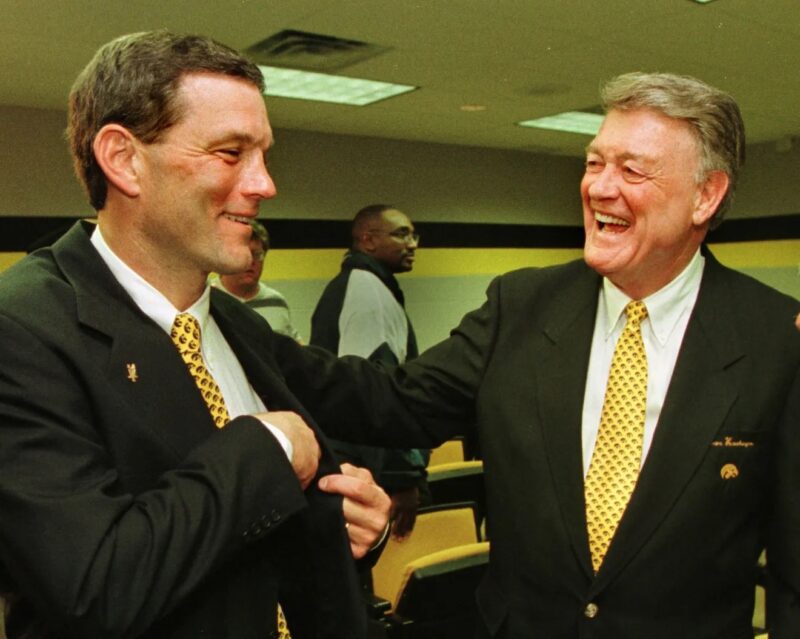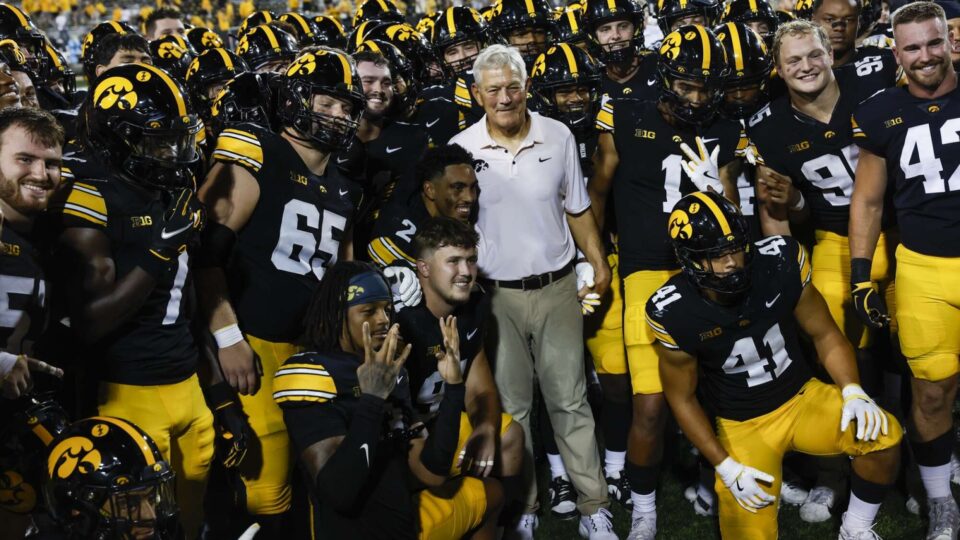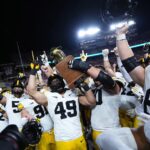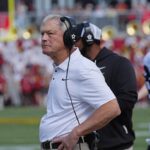The final seconds tick off the clock at Kinnick Stadium. The student section is half empty, and that might be generous. Once a sea of gold, the silvery hue of empty aluminum bleachers becomes the dominant color once again.
Fireball shooters and crushed cans litter the wasteland. Puddles of alcohol begin to evaporate. Popcorn kernels stick to the bottom of shoes. Fraternity brothers and sorority sisters have long since departed for downtown. There’s bar cover to beat, after all. This game has been over since it first appeared on the schedule.
It’s nothing out of the ordinary. The final score reads Iowa 47, UMass 7. It’s a typical non-conference, early season beatdown.
Despite this, head coach Kirk Ferentz receives an orange Gatorade shower. Hugs. Pats on the back. Handshakes. Reporters flock towards him, yellow media bibs flapping as they stride.
Ferentz entered the game tied with Woody Hayes as the winningest coach in Big Ten History. Now with win number 206 under his belt, he stands alone at the top.
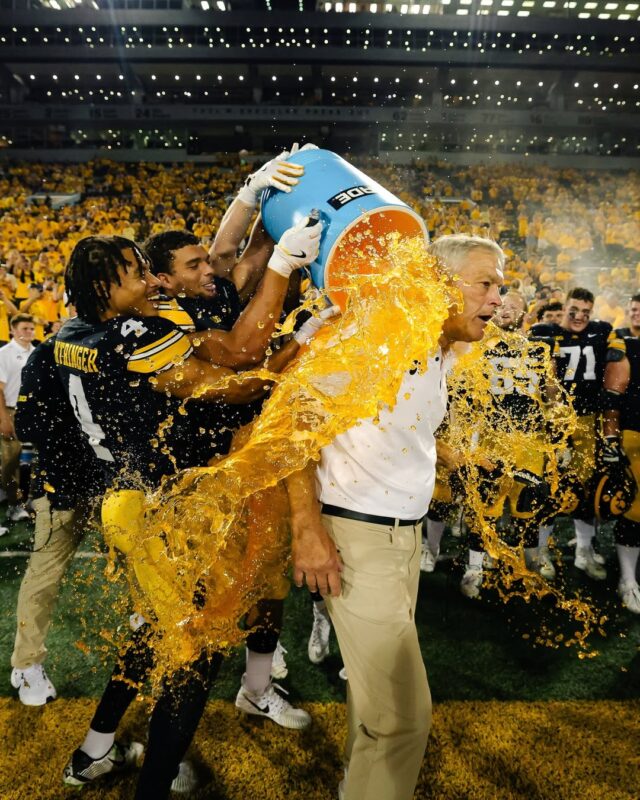
There’s a who’s who of Iowa nobility at this game. Barbara Wilson, the president of the university, walks by on the field and smiles. Women’s basketball coach Jan Jensen takes a picture with students in the crowd. Lisa Bluder waves as she walks through the tunnel.
The Soccer team is here. The volleyball team is here. The men’s basketball team is here. And despite all of this support, everywhere you look, there’s also someone calling for Kirk Ferentz to lose his job.
“I don’t respect Kirk Ferentz because I think he’s a total fraud as an elite coach,” SEC analyst Paul Finebaum said last month. “The guy has done nothing other than being mediocre and pedestrian.”
Or just check the Iowa vs UMass highlights comments section. “Kiek needs to retire, I’m tired of mediocracy,” SKIBUM67 writes matter-of-factly, misspelling Kirk’s name in the process.

But you get the sense from listening to his players and his peers that they view him in a very different light.
Kirk Ferentz’s resume looks different than those of other legendary coaches. There are no national titles. No recent playoff births. You can count the number of conference championships on one hand. His legacy doesn’t present itself on the side panel of his Wikipedia page. It’s made up of intangibles.
Over 1000 players have come through the Iowa program under Ferentz’s eye. 94 of them were drafted. 220 found their way onto NFL rosters. “Most of them like me better after they leave here, I think,” Ferentz jokes.
“ He’s just like the perfect Midwestern guy,” quarterback Mark Gronowski said. “He knows so much about the game, knows so much about life and sports in general.”
This is the disconnect. Hearing Ferentz talk, how can you not love the guy? Watching Ferentz’s team play, how can you not demand change?
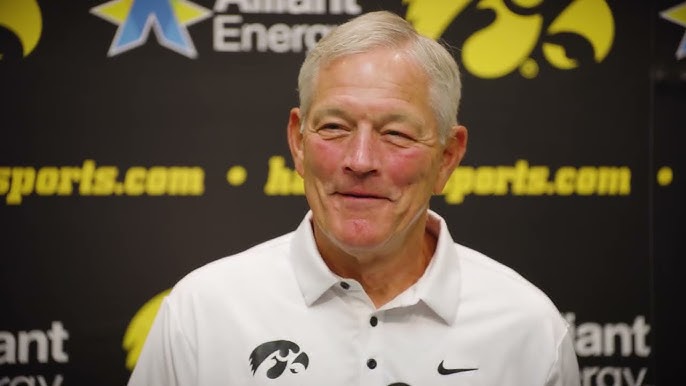
Most nights, Iowa’s offense looks archaic. The pass concepts are simplistic. The identity of the team revolves around winning in the trenches. It’s a defense first system.
Tonight, things looked different. Mark Gronowski opened the game with three consecutive play action passes, including a 45-yard strike to Sam Phillips and a 20-yard touchdown to Seth Anderson.
Iowa held a 20-7 lead at the end of the first quarter, and sat comfortably at 30-7 come halftime.
Iowa’s utility man Kaden Wetjen bounced back from a rough outing against Iowa State to deliver his most electric performance to date, running laps around the Minutemen kick coverage unit.
He gained 39 yards on his first punt return and took an end around 20 yards to the house before the first quarter ended. In the second, he added another 40-yard punt return.
His biggest play came in the third quarter. Drifting back to the five yard line to field the punt over his shoulder, Wetjen split a pair of Minutemen defenders, then worked his way across the width of the field to the right sideline. Around the 30 yard line, he cut back to the inside, slipped a couple of arm tackles, and outran the rest of the defense to score.
In the end, it went down as a 40 point win for the Hawkeyes. While Iowa fans celebrated a dominant performance on both sides of the ball, detractors pointed to the caliber of opponent. They say where was this last week against Iowa State. Do it against a Big Ten opponent, then we’ll talk.
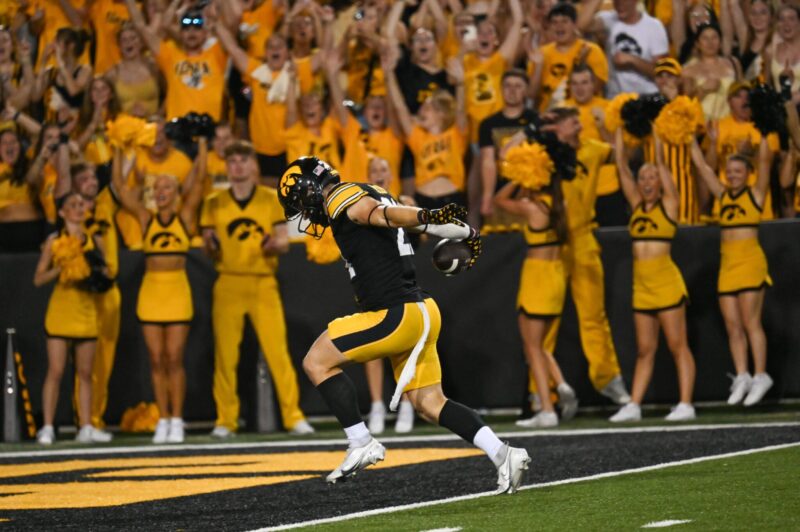
In the press room, tripods compete for space like trees in a forest. Bulky news cameras are fastened in place. Discarded suit jackets rest on top of backpacks. Roughly 50 people pack into the poorly ventilated space. Most are there to turn a story. A select few just want to hear what Ferentz has to say about 206.
After some words from athletic director Beth Goetz, Ferentz stands at the podium with a fresh white polo and a smile.
At one point, he fields a question about what he’s built as a head coach. He recalls a time when his wife suggested the idea of changing schools every ten or so years. “She’s probably right. She’s right about most stuff,” he laughed. “The flip side is you think about what you miss.”
“Believe me, the season is what it’s all about, but once you get past the football, there’s a lot more to it,” he said. “If you move around, you miss out on those opportunities. It’s just not the same.”
